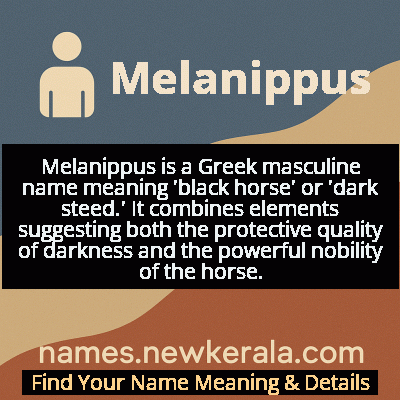Melanippus Name Meaning & Details
Origin, Popularity, Numerology Analysis & Name Meaning of Melanippus
Discover the origin, meaning, and cultural significance of the name MELANIPPUS. Delve into its historical roots and explore the lasting impact it has had on communities and traditions.
Name
Melanippus
Gender
Male
Origin
Greek
Lucky Number
9
Meaning of the Name - Melanippus
Melanippus is a Greek masculine name meaning 'black horse' or 'dark steed.' It combines elements suggesting both the protective quality of darkness and the powerful nobility of the horse.
Melanippus - Complete Numerology Analysis
Your Numerology Number
Based on Pythagorean Numerology System
Ruling Planet
Mars
Positive Nature
Generous, passionate, energetic, and humanitarian.
Negative Traits
Impulsive, impatient, moody, and can be overly emotional.
Lucky Colours
Red, maroon, scarlet.
Lucky Days
Tuesday.
Lucky Stones
Red coral, garnet.
Harmony Numbers
1, 2, 3, 6.
Best Suited Professions
Military, sports, philanthropy, leadership roles.
What People Like About You
Courage, energy, leadership, generosity.
Famous People Named Melanippus
Melanippus of Thebes
Mythological Warrior
Heroic defender of Thebes who killed two of the Seven attackers before falling in battle
Melanippus (son of Astacus)
Mythological Hero
Theban warrior celebrated for his bravery during the war against the Seven
Melanippus (Arcadian)
Mythological Athlete
Son of Ares known for his exceptional speed and athletic prowess
Melanippus (Trojan War)
Mythological Warrior
Trojan fighter mentioned in Homer's Iliad who battled Greek heroes
Name Variations & International Equivalents
Click on blue names to explore their detailed meanings. Gray names with will be available soon.
Cultural & Historical Significance
Extended Personality Analysis
Individuals bearing the name Melanippus are typically characterized by strong protective instincts, unwavering loyalty, and courageous determination. Drawing from the mythological archetype of the Theban defender, they often exhibit a profound sense of duty to their community or cause, willing to make significant sacrifices for what they believe is right. Their personality combines the steadfast reliability suggested by the 'black' or 'dark' element of their name with the powerful, energetic qualities associated with the 'horse' component, creating a balanced individual who is both grounded and dynamic. In modern psychological terms, a person named Melanippus would likely demonstrate high levels of conscientiousness and bravery, with a natural inclination toward leadership in challenging situations. They tend to be strategic thinkers who can assess risks effectively while maintaining commitment to their principles. However, they might also struggle with being overly rigid or taking on excessive responsibility, reflecting the tragic elements of their mythological namesake who fell while defending his city. This combination creates a personality profile of the reliable protector who may sometimes bear burdens too heavy for any single individual.
Modern Usage & Popularity
In contemporary naming practices, Melanippus remains an exceptionally rare choice, primarily confined to academic circles, mythological enthusiasts, or families with strong connections to classical Greek heritage. The name sees virtually no usage in mainstream naming trends and doesn't appear on modern baby name charts in any country. Its contemporary application is largely limited to historical fiction, classical studies references, and occasionally as a distinctive middle name for those wanting to honor Greek mythological traditions. The name's complexity, ancient sound, and association with specific mythological narratives make it challenging for modern adoption outside these specialized contexts. Recent decades have shown no significant change in its popularity, maintaining its status as a niche selection for those specifically seeking mythological names with strong heroic and protective connotations rather than following conventional naming patterns.
Symbolic & Spiritual Meanings
Symbolically, Melanippus represents the powerful fusion of darkness and equine strength, embodying the mysterious endurance and protective qualities of the night-colored horse. The 'black' element suggests depth, resilience, and the protective cover of darkness, while the 'horse' component symbolizes freedom, noble service, and raw power. Together, they create a symbolic identity of the guardian who operates from a place of hidden strength and unexpected resilience. In broader metaphorical terms, the name evokes the concept of the dark champion—one who defends not through ostentatious heroism but through steadfast, often uncelebrated dedication. This symbolism extends to representing those who protect their communities during crises, the quiet defenders who embody loyalty and sacrifice without seeking recognition. The name carries profound connotations of ancient wisdom, martial honor, and the tragic beauty of necessary sacrifice for greater causes, making it a powerful symbolic representation of protective strength born from darkness and determination.

